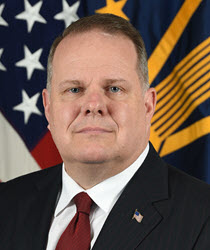
The National Security Institute and the Mercatus Center hosted a Crisis in the Taiwan Straits Wargame, which was a simulation that explored the dynamics of human versus AI decision-making during crises to shed light on the crucial role of AI in critical situations.
The crisis scenario involved the United States and China. Human participants represented members of the National Security cabinet and generated priority objectives and debate courses of action. At the same time, generative AI systems represented members of a separate national security cabinet, which set its own priorities and made independent decisions.
Following the scenario, participants and audience members quickly analyzed the two scenarios’ outcomes and assess the decision-making process of the human-led National Security cabinet compared to AI systems. This event offered a unique opportunity for substantive engagement and a deeper understanding of the intersection between national security and advanced AI technologies.
This event was by invitation only.
Our Participants:
Chuck Alsup, Former Principal Advisor to the Deputy Director of National Intelligence
Jason Chipman, Former Senior Council to the Deputy Attorney General at the U.S. Department of Justice
Giovanna Cinelli, Former Naval Reserve Intelligence Officer
Ambassador Cindy Courville, Former U.S. Ambassador to the African Union
Heino Klinck, Deputy Assistant Secretary of Defense for East Asia
Jane Lee, Former Senior Advisor, Senate Republican Leader Mitch McConnell
Lester Munson, Former Chief of Staff for Senator Mark Kirk of Illinois
Jamil N. Jaffer, Founder & Executive Director, National Security Institute
About our Participants:
 “Chuck” Alsup is the retired President of INSA, the premier non-profit, non-partisan intelligence and national security organization which brings together the public, private, and academic sectors to collaborate on the most challenging policy issues and potential solutions. He was appointed to this position after having served five years as the INSA Vice President for Policy, overseeing all of the activities of INSA’s policy-focused councils, task forces, and working groups. He joined INSA following 40+ years of federal service. Prior to retiring from the government, Mr. Alsup most recently served with the Office of the Director of National Intelligence as the Associate Deputy Director of National Intelligence for Policy, Plans, and Requirements (ADDNI/PPR).
“Chuck” Alsup is the retired President of INSA, the premier non-profit, non-partisan intelligence and national security organization which brings together the public, private, and academic sectors to collaborate on the most challenging policy issues and potential solutions. He was appointed to this position after having served five years as the INSA Vice President for Policy, overseeing all of the activities of INSA’s policy-focused councils, task forces, and working groups. He joined INSA following 40+ years of federal service. Prior to retiring from the government, Mr. Alsup most recently served with the Office of the Director of National Intelligence as the Associate Deputy Director of National Intelligence for Policy, Plans, and Requirements (ADDNI/PPR).
 Jason Chipman is at attorney at the law firm Wilmer Cutler Pickering Hale & Dorr LLP in Washington, D.C. He is a leading authority on cybersecurity matters and has advised companies in response to some of the largest cybersecurity incidents in the United States. He joined WilmerHale in 2012 after serving as Senior Counsel to the Deputy Attorney General at the U.S. Department of Justice, and after previously serving as Counsel for National Security Law and Policy in the Department’s National Security Division. During his time at the Department of Justice, Mr. Chipman’s practice focused on National Security Council issues, representing the government in the Foreign Intelligence Surveillance Court, cybersecurity, and various DoD and Intelligence Community activities. He received numerous government awards for his work on national security matters and speaks frequently on national security law topics.
Jason Chipman is at attorney at the law firm Wilmer Cutler Pickering Hale & Dorr LLP in Washington, D.C. He is a leading authority on cybersecurity matters and has advised companies in response to some of the largest cybersecurity incidents in the United States. He joined WilmerHale in 2012 after serving as Senior Counsel to the Deputy Attorney General at the U.S. Department of Justice, and after previously serving as Counsel for National Security Law and Policy in the Department’s National Security Division. During his time at the Department of Justice, Mr. Chipman’s practice focused on National Security Council issues, representing the government in the Foreign Intelligence Surveillance Court, cybersecurity, and various DoD and Intelligence Community activities. He received numerous government awards for his work on national security matters and speaks frequently on national security law topics.

Giovanna M. Cinelli is a partner at Morgan Lewis and the leader of their international trade and national security practice. As a practitioner for more than 25 years, she counsels clients in the defense and high-technology sectors on a broad range of issues affecting national security and export controls, including complex export compliance matters, audits, cross-border due diligence, and export enforcement, both classified and unclassified. Giovanna served as a Naval Reserve intelligence officer, where she specialized in Soviet-era submarine platforms, national security, and intelligence issues.
 Ambassador (retired) Cindy Courville, Ph.D. currently serves on the executive board of the National Security Executives and Professional Association (NSEPA) and as a member of the Steering Committee of the Leadership Council for Women in National Security (LCWINS). Within the U.S. government national security enterprise Ambassador Courville has served in a number of positions for nearly 20 years in the Department of State, the National Security Council, the Defense Intelligence Agency , and the Office of the Secretary of Defense. Ambassador Courville served as the first U.S. Ambassador to the African Union where she was significantly instrumental in organizing and managing the fiftieth U.S. mission in Africa from November 2006-May 2008. She led the U.S., European Union, and Non-African Observer countries negotiating efforts to design and implement the Strategic Planning Management Unit to support the African Union Mission to Somalia.
Ambassador (retired) Cindy Courville, Ph.D. currently serves on the executive board of the National Security Executives and Professional Association (NSEPA) and as a member of the Steering Committee of the Leadership Council for Women in National Security (LCWINS). Within the U.S. government national security enterprise Ambassador Courville has served in a number of positions for nearly 20 years in the Department of State, the National Security Council, the Defense Intelligence Agency , and the Office of the Secretary of Defense. Ambassador Courville served as the first U.S. Ambassador to the African Union where she was significantly instrumental in organizing and managing the fiftieth U.S. mission in Africa from November 2006-May 2008. She led the U.S., European Union, and Non-African Observer countries negotiating efforts to design and implement the Strategic Planning Management Unit to support the African Union Mission to Somalia.
 Jamil N. Jaffer is the Founder and Executive Director of the National Security Institute at the Antonin Scalia Law School at George Mason University where he also serves as an Assistant Professor of Law, Director of the National Security Law and Policy Program, and Director of the Cyber, Intelligence, and National Security LL.M. Program. Jamil also teaches classes on counterterrorism, intelligence, surveillance, cybersecurity, and other national security matters, as well as a summer course held abroad with U.S. Supreme Court Justice Neil M. Gorsuch. Jamil is also affiliated with Stanford University’s Center for International Security and Cooperation and previously served as a Visiting Fellow at the Hoover Institution from 2016 to 2019.
Jamil N. Jaffer is the Founder and Executive Director of the National Security Institute at the Antonin Scalia Law School at George Mason University where he also serves as an Assistant Professor of Law, Director of the National Security Law and Policy Program, and Director of the Cyber, Intelligence, and National Security LL.M. Program. Jamil also teaches classes on counterterrorism, intelligence, surveillance, cybersecurity, and other national security matters, as well as a summer course held abroad with U.S. Supreme Court Justice Neil M. Gorsuch. Jamil is also affiliated with Stanford University’s Center for International Security and Cooperation and previously served as a Visiting Fellow at the Hoover Institution from 2016 to 2019.
 Heino Klinck performed the duties of the Deputy Assistant Secretary of Defense for East Asia from August 12, 2019 to January 19, 2021. In this role, he oversaw all U.S. defense policy throughout the region, advancing U.S. national security interests through defense strategy development, security cooperation, contingency planning, and program oversight. He brings more than three decades of private sector and military experience to this position including 8 years living and working in the Indo-Pacific Region. During his military career, Colonel (retired) Klinck served in various tactical, operational, diplomatic, and strategic assignments in the U.S., Asia, Europe, and the Middle East. As the Director of Army International Affairs in the Pentagon, he was the senior advisor on geo-political, foreign affairs, and international security cooperation issues to the U.S. Army’s leadership. He led bilateral staff talks and counterpart consultations with partners and allies globally including with Australia, Japan, and South Korea.
Heino Klinck performed the duties of the Deputy Assistant Secretary of Defense for East Asia from August 12, 2019 to January 19, 2021. In this role, he oversaw all U.S. defense policy throughout the region, advancing U.S. national security interests through defense strategy development, security cooperation, contingency planning, and program oversight. He brings more than three decades of private sector and military experience to this position including 8 years living and working in the Indo-Pacific Region. During his military career, Colonel (retired) Klinck served in various tactical, operational, diplomatic, and strategic assignments in the U.S., Asia, Europe, and the Middle East. As the Director of Army International Affairs in the Pentagon, he was the senior advisor on geo-political, foreign affairs, and international security cooperation issues to the U.S. Army’s leadership. He led bilateral staff talks and counterpart consultations with partners and allies globally including with Australia, Japan, and South Korea.

Jane Lee is currently the Chief Government Affairs at Rebellion Defense. She previously served as Senate Republican Leader Mitch McConnell’s senior adviser on budget, appropriations, and economic policy where she helped steer the successful passage of the bipartisan CARES Act and COVID-19 economic rescue packages, the 2019 Bipartisan Budget Act, 2017’s budget resolutions and reconciliation vehicles for tax reform, and over 50 full year appropriations bills.
 Lester Munson is Vice President, International at BGR Group, a leading government relations firm in Washington, DC, where he consults with foreign governments, corporations, and advocacy groups. Lester joined BGR Group in November 2015 after a 26-year career on Capitol Hill and in the Executive Branch. He was most recently Staff Director of the Senate Foreign Relations Committee. Previously, Lester was Chief of Staff for Senator Mark Kirk of Illinois. During his tenure, Senator Kirk became the leading Republican voice in the Senate on Iran and other national security issues. During the Bush Administration, Lester served as Deputy Assistant Administrator at the U.S. Agency for International Development, where he focused on legislative affairs as well as global health issues.
Lester Munson is Vice President, International at BGR Group, a leading government relations firm in Washington, DC, where he consults with foreign governments, corporations, and advocacy groups. Lester joined BGR Group in November 2015 after a 26-year career on Capitol Hill and in the Executive Branch. He was most recently Staff Director of the Senate Foreign Relations Committee. Previously, Lester was Chief of Staff for Senator Mark Kirk of Illinois. During his tenure, Senator Kirk became the leading Republican voice in the Senate on Iran and other national security issues. During the Bush Administration, Lester served as Deputy Assistant Administrator at the U.S. Agency for International Development, where he focused on legislative affairs as well as global health issues.
